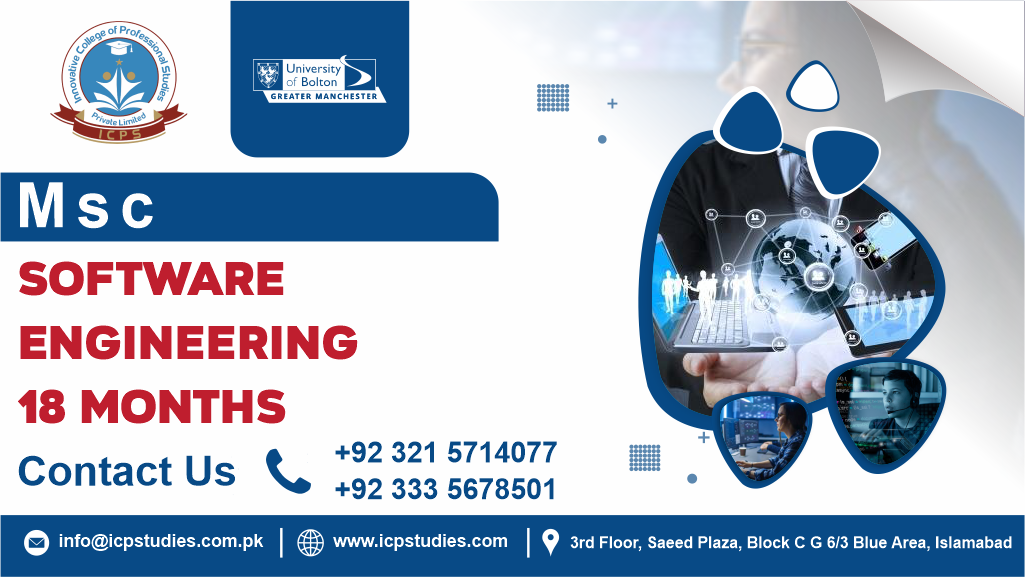Course Overview
Our MSc in Software Engineering offers graduates with a background in computing and programming an opportunity to deepen their expertise in advanced software methodologies. Studying at the University of Bolton, you’ll not only enhance your knowledge of software engineering but also experience life at our supportive, student-focused, multicultural campus located in the heart of the North West of England.
This hands-on, practical course is designed to sharpen your problem-solving, creative thinking, and decision-making skills. You’ll engage with real-world scenarios based on the extensive industry experience of our tutors and professional contacts. As you study cutting-edge software engineering methodologies and development techniques, you’ll deepen your understanding of concepts such as design patterns and modern software practices.
We’ll guide you in developing the ability to adapt to the evolving landscape of the software engineering industry, ensuring you’re well-prepared for future career challenges. Since software engineering is a global field, you will also explore issues such as localization in application development to understand the broader international context.
Designed in collaboration with industry partners, this master’s degree equips you with the skills that employers value while addressing the ethical and environmental challenges you’ll encounter in your professional career.
Our coursework is tailored to help you develop critical intellectual skills and prepares you for your next career stage. The program focuses on enhancing your research, critique, innovation, and synthesis abilities, while also improving your teamwork, report writing, and presentation skills. Moreover, the course nurtures lifelong learning, empowering you to take charge of your professional development and maximize your potential.
We offer this course with both full-time (1 year) and part-time (2 years) options. For details, please visit the specific course search pages for the full-time MSc Software Engineering or the part-time MSc Software Engineering.
Highlights
- Our dedicated faculty bring a wealth of professional experience, technical expertise, and academic qualifications, offering you diverse perspectives that will broaden your horizons.
- We maintain small lecture and practical class sizes to ensure personalized attention, fostering interaction and enabling you to engage with classmates and instructors.
- With strong connections to the software engineering industry, we continuously update the course content to remain relevant and introduce you to the latest developments and innovations.
- We are committed to enhancing your employability and career prospects, providing opportunities to network with industry professionals through guest lectures and events.
Key Features
- A friendly and supportive environment with small class sizes, purpose-built teaching facilities, and comprehensive student support services.
- Personalised attention, with access to help and guidance whenever you need it to ensure your success.
- Significant investment in cutting-edge IT facilities to support your learning, including remote access to computing resources for flexible study.
- Strong relationships between lecturers and students, fostering an interactive and supportive learning experience.
- Bolton offers a vibrant environment with a variety of shops, restaurants, bars, and leisure activities. Just 20 minutes from Manchester, one of the UK’s most diverse and energetic cities, and surrounded by scenic countryside, Bolton provides an excellent base for exploring the cultural and outdoor activities the North West has to offer.
Entry Requirements
Typically, you should have a minimum of a lower second class (2.2) honours degree in a computer science-related field or software engineering.
We also welcome applications from candidates with relevant work experience, which may be considered as an alternative to, or in addition to, the formal academic qualifications outlined above. This will be assessed in accordance with the University’s Recognition of Prior Experiential Learning (RPEL) procedures.
In some cases, you may be asked to attend an interview and/or provide a portfolio of your work to support your application.
Career Opportunities
The MSc in Software Engineering (18-month duration) at the University of Bolton is designed for computer science graduates and experienced professional programmers, focusing on complex software systems, methodologies, metrics, and tools used throughout the software engineering process. As a software engineer, your responsibilities may include gathering project requirements, writing algorithms, coding, testing, deploying, and maintaining software systems.
As a graduate of this program, you will develop a broad set of technical skills, including software reuse, agile development, design patterns, and software architecture. Additionally, you’ll gain valuable transferable skills such as advanced IT proficiency, analytical thinking, communication, creativity, innovation, problem-solving, project management, and organizational abilities.
What can I do with this qualification?
Graduates of this MSc in Software Engineering will be well-prepared for roles in software engineering research or large-scale software development projects. Relevant career options include positions in software engineering, software architecture, game development, systems development, web design and development, search engine optimization, information systems management, and business analysis.
The program also serves as a foundation for those interested in pursuing PhD research in software engineering or related computing fields.
Alternative career options
This qualification can also open doors to a wide range of other career paths, which may require relevant experience or further postgraduate study. Some alternative options include:
- Finance
- Software project management
- E-commerce
- Electrical engineering
- Quality management
- Research and development
- Teaching and education
- Cybersecurity
- Consultancy
- Healthcare
- Public services and local government
Modules
The following modules may include both compulsory and optional elements. Not all modules listed may be available during your course.
- Professional Practice
- Research Methods
- Contemporary Software Engineering Practices
- Advanced Software Development
- DevOps
- Information Security (InfoSec)
- Data Analysis and Visualization
- Project







